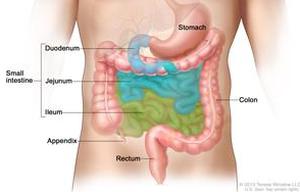

MedFriendly®


Ileitis
Ileitis is a relatively rare condition in which there is
inflammation of the ileum. The ileum is the last, longest,
and narrowest of the three parts that make up the small
intestine. The intestine is a tube shaped structure that
is part of the digestive tract. The small intestine is a
part of the intestine that takes in all of the nutrients
(healthy substances) that the body needs. Ileitis can
also involve the colon, which is the major part of the
large intestine. The large intestine absorbs moisture
from the matter that is left after it is digested in the
small intestine, and excretes the waste from the anus.
Parts of the small intestine.
FEATURED BOOK: Eating Right for a Bad Gut
Excrete means to release from the body as waste. Ileitis can be chronic, meaning it has
lasted a long time. Ileitis can also be acute, meaning it has occurred suddenly.
WHAT ARE SIGNS & SYMPTOMS OF ILEITIS?
Other symptoms include swelling of the belly, fever, loss of appetite, constipation
(difficulty pooping), and/or diarrhea. Over time, ileitis can cause weight loss and anemia.
Anemia is a condition in which there is an abnormally low amount of hemoglobin in the
blood. Hemoglobin is a substance present in red blood cells that helps carry oxygen to
cells in the body.
"Where Medical Information is Easy to Understand"™
WHO GETS ILEITIS?
Ileitis affects males and females in equal numbers. It usually affects
people under the age of 40.
WHAT CAUSES ILEITIS?
There are many possible causes of ileitis. Most often, there is
something present that irritates the ileum and causes an abnormal
reaction. However, the specific substance that is causing the
irritation is often difficult to identify.
Complications of surgery to the digestive system can also cause ileitis, as can an infection of the small
intestine. Another cause of ileitis is Crohn's disease, in which any part of the digestive tract (most
commonly the lower part of the ileum) becomes inflamed.
HOW IS ILEITIS TREATED?
In some instances after the first sudden attack of ileitis, the condition does not need any treatment and
goes away by itself. In such cases, a full recovery can be expected. However, most people with ileitis
have the chronic (long-term) form, in which the attacks continue to occur. The major goal of the treatment
is to relieve the symptoms since there is no specific treatment for ileitis. Rest and eating a healthy,
balanced diet is advised. If the condition is caused by an infection, medications used to fight the bacteria
that causes the infection may be given. Medications may also be given that decrease or heal the
inflammation causing the problem. In the worst case scenario, surgery can be used to go around or
remove the damaged area of the ileum. It should be noted that surgery usually does not eliminate the
condition.
WHAT IS THE ORIGIN OF THE WORD,"ILEITIS"?
Ileitis comes from the Latin word "ileum" meaning "intestine," and the Greek word "itis" meaning
"inflammation." Put the two words together and you have "intestine inflammation."















